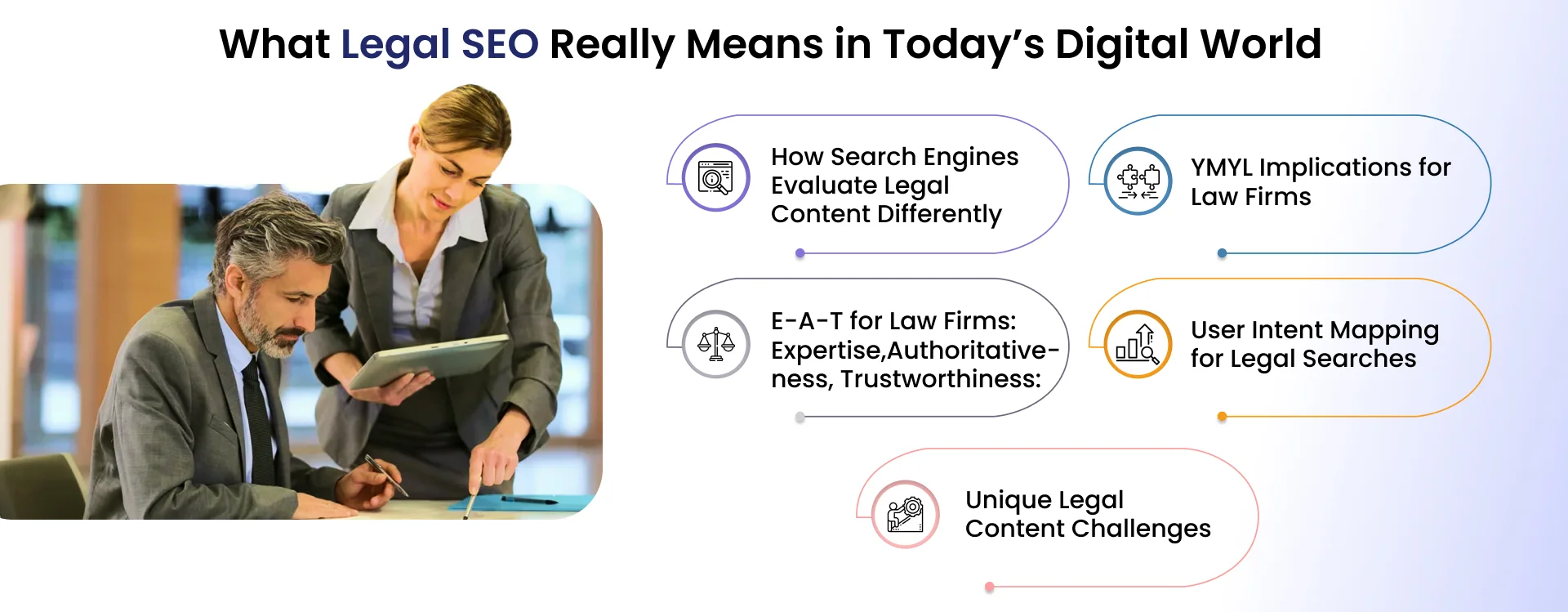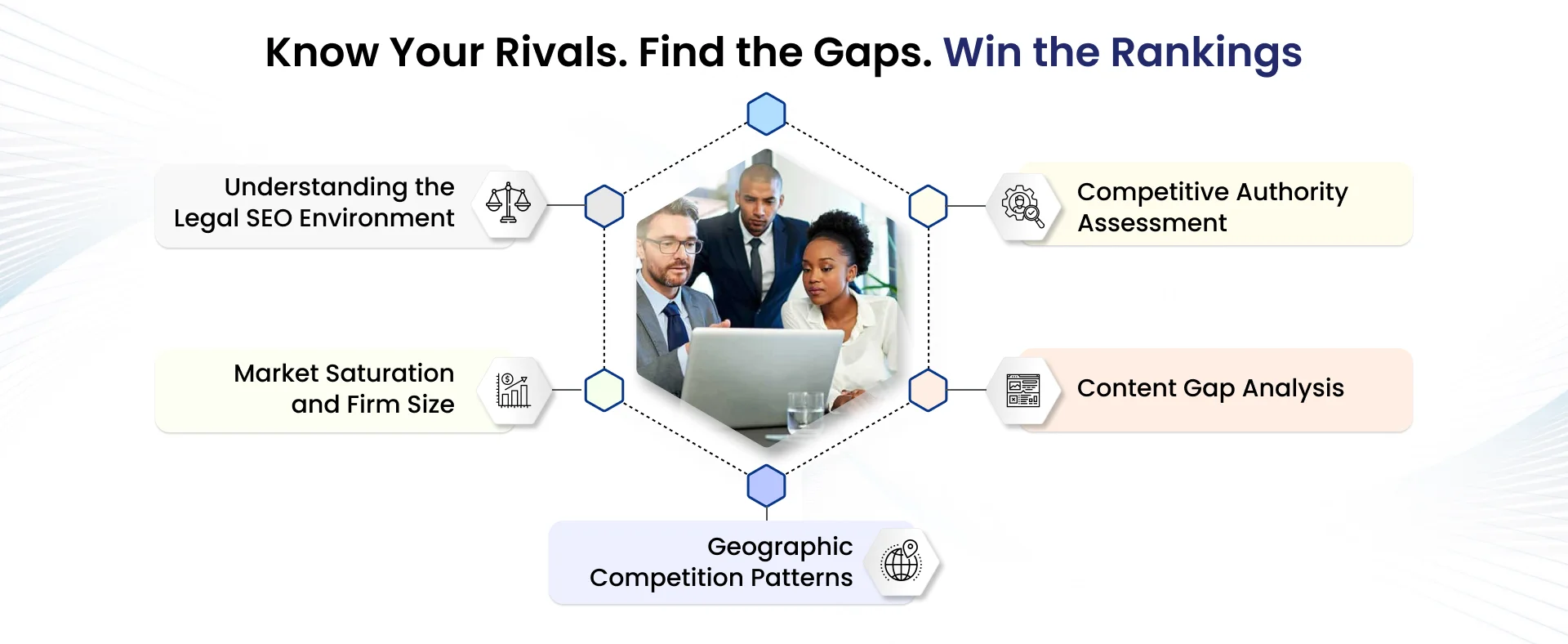
Let’s be honest, the courtroom isn’t the only place where cases are won anymore. In today’s world, clients don’t start their search for legal help in a law library or a phone book. They Google it. Yet, many firms still rely heavily on outdated marketing tactics while their digital competitors grab all the attention (and the clients).
In fact, according to recent legal industry digital transformation statistics, over 70% of legal clients begin their journey online. And still, countless skilled lawyers go unnoticed simply because they rank on page two or worse. That’s the cost of invisible expertise — and it’s one no law firm can afford in 2025.
Traditional marketing fails in today’s digital legal landscape not because lawyers are doing less, but because Google’s doing more. It’s not about shouting louder. It’s about being found smarter. And that’s exactly what this guide delivers — not just generic "SEO tips for law firms," but a complete understanding of what actually works in the legal space and why.
SEO (Search Engine Optimization) is the process of improving your law firm’s visibility on search engines like Google so potential clients can find you when they search for legal services. It’s not just about ranking high—it’s about showing up for the right people, at the right moment, with the right message.
Think about this: most people don’t scroll past the first page of search results. If your firm isn’t showing up there, you’re basically invisible. And no matter how experienced your team is or how many cases you’ve won, none of it matters if people can’t find you online.
For law firms, SEO isn’t optional anymore; it's your digital lifeline. Whether someone is looking for a personal injury lawyer, immigration help, or family law advice, they’re most likely searching online first. A well-optimized website ensures you’re part of that decision-making journey.
But good SEO does more than bring in traffic—it builds trust. A strong search presence signals credibility. It tells clients you’re established, professional, and exactly who they should be calling next. To help you navigate SEO with clarity, we’ve broken it down into 5 focused chapters—each one unpacking a key element of what makes legal SEO work for modern law firms.
In today’s digital-first world, your law firm’s visibility begins with search engines. But legal content isn't judged like a regular blog post or business page. It’s held to higher standards—where accuracy, trust, and authority can make or break your rankings. To build a powerful online presence, it’s critical to understand how SEO works specifically for legal services, and why Google treats your content with extra scrutiny. 
Google treats legal content as high-risk. Why? Because it falls under YMYL (Your Money or Your Life) — content that could impact someone’s finances or well-being. That means the bar is higher. Google needs to trust your law firm’s website before it shows it to potential clients.
Search engines also examine context. Legal SEO isn’t about jamming in keywords like "best lawyer near me" a dozen times — it’s about making your site a reliable source. For law firms, that means citing case law where appropriate, being clear about attorney qualifications, and offering content that's well-researched and regularly updated.
Legal websites must demonstrate not just relevance but responsibility. Your content must be accurate, helpful, and published under clear credentials. Law firm SEO tips start with one core truth: authority isn’t optional.
Google scrutinizes YMYL content more intensely to protect users from potentially harmful advice. If your legal content lacks real-world backing — such as court outcomes, state-specific laws, or citations from bar associations — it will struggle to rank.
An FAQ page with real attorney bios? That’s expertise. Well-cited content covering complex areas like immigration or litigation? That’s authority. Clear contact details, bar credentials, and privacy policies? That’s trust. This trio — E-A-T — is non-negotiable for SEO for law firm websites.
To excel in this, every page on your law firm’s website should reinforce E-A-T. Showcase your credentials. Write legal articles with bylines and author bios. Include citations and references to reputable sources. This is how you build digital trust — and it’s also how you outrank competitors who ignore these fundamentals.
Think like a client: Are they panicking after an arrest? Researching divorce options? Looking for a consultation? SEO for law firm content must be organized around these emotions and needs — not just practice area jargon.
There’s no one-size-fits-all when it comes to legal user intent. Users might search with:
You must craft content that addresses all three levels, structured to support the user journey step-by-step.
Legal content is difficult. It's regulated, complex, and trust-sensitive. The key is balancing depth with digestibility — being the expert without sounding inaccessible.
Regulatory guidelines often restrict legal marketing language. That means you need to write clearly and confidently without making false claims or unethical promises. Every word must be vetted, but still human. And for SEO to work, you must still be strategic with keywords, structure, and linking — all while staying compliant.
Behind every legal search is a personal story — often one marked by urgency, confusion, or stress. Understanding the mindset of potential clients during these moments helps you craft content that resonates, reassures, and converts. This chapter dives into how emotions and intent shape the way people search for legal help online.

Legal searches aren’t like shopping for shoes — they’re fueled by emotion, urgency, and high stakes. Whether someone just got a DUI or is looking for help in a custody battle, their search behavior is shaped by anxiety and the need for clarity.
There are two key behavioral modes:
Clients aren’t just searching for a service; they’re often searching in a state of crisis. Your content must speak with empathy, clarity, and calm authority. Good legal SEO content doesn’t just answer questions — it reduces anxiety.
Use reassuring headlines, clear answers, and step-by-step breakdowns. Empathy earns engagement, and engagement signals quality to search engines.
Mobile devices dominate emergency searches, while desktop tends to dominate research-mode usage. Your website must be optimized for both:
The best SEO tips for law firms often begin with design choices.
Understanding the type of intent helps you match content with searchers’ needs. For example:
Mapping your content to these stages helps guide users through the journey — from a Google search to your contact form.
The Client Journey from Search to Consultation SEO for law firm websites is more than visibility. It’s about building a seamless client path:
A clear and intuitive journey supports trust — both for Google and for your future clients.
Trust is the foundation of every attorney-client relationship—and it begins long before the first consultation. In the digital space, your law firm’s credibility must be communicated through every element of your website. From professional credentials to secure design, this chapter explores how to build the kind of online authority that earns client confidence and higher search rankings.

Today, being a good lawyer isn’t enough. Your website must prove it. Here’s what that looks like:
One of the best law firm SEO tips? Don’t skim the surface. Detailed, long-form legal content ranks better because it satisfies Google’s quality standards — and builds trust with readers.
Cover every angle of a topic. Include examples, cite statutes, explain consequences. The more value your content offers, the more authority it builds.
Focus is key. Google rewards websites that go deep in a niche. Instead of creating scattered content on every topic, build a powerful knowledge hub for your core services — whether that’s immigration law, estate planning, or employment disputes.
Link related articles. Create glossary pages. Use schema markup to help search engines understand your topic coverage.
Google’s quality evaluators look at how clearly your law firm demonstrates legal expertise, authority, and trust—through accurate content, proper credentials, and reliable sources.
They evaluate:
That’s why SEO for law firm websites must include:
Content Authority Development: Becoming a trusted legal source online requires more than publishing a few blogs. Your firm needs to create a structured content ecosystem that educates, engages, and builds long-term credibility.
Accuracy, structure, and helpfulness determine whether your law firm becomes a trusted legal source online.

A powerful legal website does more than list services—it guides visitors with clarity and purpose. Your content strategy must align with how real clients think, search, and make decisions during stressful legal moments. In this chapter, we explore how content structure and user experience work together to convert traffic into trusted leads.

Most legal websites make one major mistake: organizing content by firm structure, not client need. Your navigation should reflect how people search — not your org chart.
For example:
A well-organized website isn’t just about design. It’s a strategic SEO asset. Clear site structure helps search engines understand the depth of your content and reinforces your authority in specific legal areas. The more logically your content is grouped, the better your chances of ranking across multiple related keywords.
Think:
This model helps Google understand how deep your site goes into each topic. It boosts your visibility across the board.
Your legal website isn’t just a library; it should function like a guided journey. Smart internal linking helps users explore topics in context, keeps them engaged, and encourages them to take action. It also signals to Google how your pages relate to each other.
Try This:
The result? Visitors stay longer, learn more, and are more likely to contact you.
Skip the jargon. Simplify complex topics. Break long paragraphs. Use bullet points. Speak in human, not lawyer.
Make legal ideas digestible without dumbing them down. A confident, clear tone shows you're not just a good lawyer — you’re the right lawyer.
Visual Content for Legal Websites Use:
These enhance engagement and drive better SEO results by improving dwell time and lowering bounce rates.
Before you can outrank the competition, you need to know exactly who you're up against. Legal SEO isn’t one-size-fits-all—every practice area has its own level of competition, budget intensity, and content saturation. This chapter explores how to assess your SEO landscape and find the right opportunities to gain a strategic edge.

The first step in analyzing your competition is understanding the terrain. Not all legal sectors face the same SEO pressure; some are fierce battlegrounds, while others have untapped potential. Recognizing where your practice falls helps shape realistic goals and content strategies.
Each practice area competes differently. Personal injury and criminal defense are saturated with high-budget SEO players. Niche areas like elder law or patent law have fewer players but still require smart content.
You don’t need a massive budget to compete. What matters more is how targeted and strategic your content is. Smaller firms can, and often do, outrank bigger players by focusing on underserved keywords and hyper-relevant content.
Larger firms often dominate due to budget, but smaller firms win when they:
Smart SEO for law firm websites isn’t about budget. It’s about focus.
In legal SEO, location is a game-changer. Since most searches are geographically driven (“divorce lawyer near me”), your site’s local optimization can make or break your visibility in search.
Don’t underestimate location. Legal queries are deeply local. Make sure your SEO strategy includes:
To outpace your competition, you need to study them closely. This means understanding not just what they're doing, but how well they’re doing it. Your goal isn’t to copy, it's to outperform.
Look at top-ranking law firms in your area:
Use tools like Ahrefs or SEMrush to reverse-engineer successful content strategies — then do it better.
To stay competitive in legal SEO, you need to know where your content falls short compared to top-performing firms. Start by identifying high-value topics your competitors cover — but you don’t. Look for:
These are opportunities to own valuable digital real estate.
SEO for law firm websites is no longer optional — it’s foundational. Clients expect more, search engines demand better, and the firms that adapt will lead.
In the future:
The best law firm SEO tips are rooted in empathy, strategy, and consistency. It’s not about tricking Google — it’s about genuinely helping the person behind the search.
And that’s where your firm has the edge. With the right digital strategy, your legal expertise can finally get the visibility — and the results — it deserves.
At Janbask Digital Design, we specialize in empowering law firms with customized SEO strategies that align with legal industry standards and evolving digital trends. Whether you're a solo practitioner or a growing legal team, we’re here to help you win the digital race — one search result at a time.
Master SEO for Your Law Practice – Grab All 5 Tips Today!

S
This blog on SEO for law firms was exactly what I needed. It explained how strategies like local SEO, keyword targeting, and content marketing can really make a difference for legal practices. I appreciated the step-by-step tips and real-world examples, which made the information practical and easy to apply. After reading, I feel more confident about improving my firm’s online visibility. Highly recommend this resource to any attorney looking to grow their digital presence.
E
I never realized how much SEO could impact a law firm’s visibility until I read this blog. The tips on content creation and link building were clear and actionable. It’s one of the best resources I’ve come across on digital marketing for attorneys.